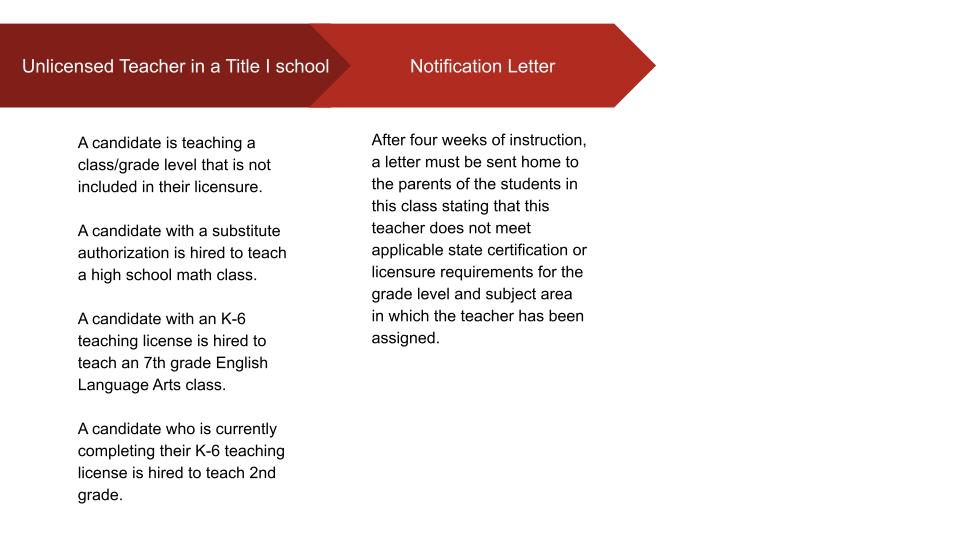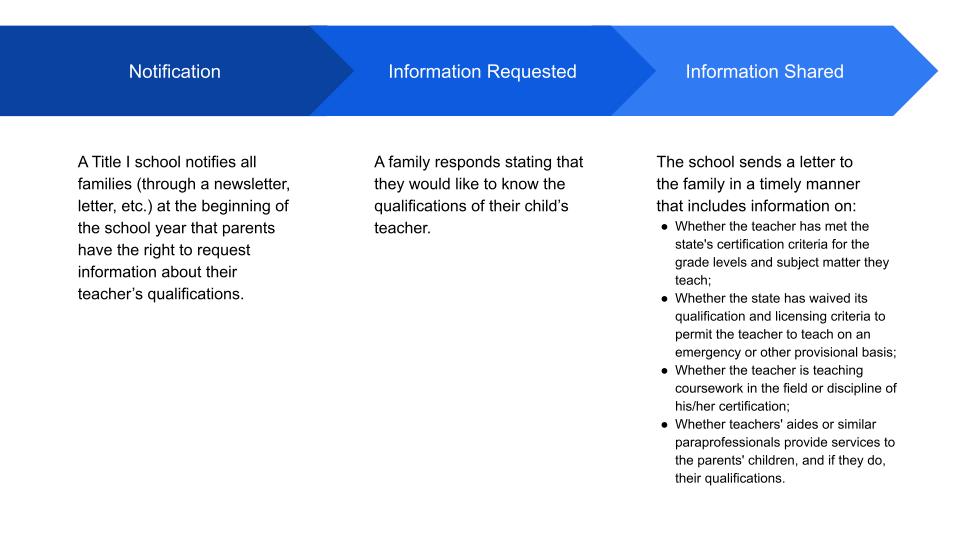You are here
Educator Qualification Requirements Under ESSA
Overview
Under the Every Student Succeeds Act (ESSA) educators employed in schools supported with Title I, Part A funds must meet state certification requirements. This page clarifies teacher and paraprofessional qualifications under Colorado statute, parent notification requirements under ESSA, and key human capital considerations where gaps in access to effective, in-field, and experienced educators (in Colorado referred to as the Equitable Distribution of Teachers) are identified.
Educator Qualification Requirements
Teacher Certification Requirements: Under ESSA, teachers and paraprofessionals in Title I schools must meet state certification requirements. Pursuant to sections 22-63-201 and 22-32-126, C.R.S., a Colorado license or authorization is required for employment as a teacher, special services provider or principal in a Colorado school or school district. All licenses and authorizations must be endorsed to indicate the grade levels/developmental levels and specialization area(s) which are appropriate to the applicant's preparation, training and experience.
Types of Colorado teacher licenses include:
-
Initial license - Valid for 3 years.
-
Initial Special Services license - Valid for 3 years.
-
Professional license - Valid for 5 years.
-
Master Certificate - Valid for the same period as a professional license is valid and renewable.
-
Alternative teacher license - Valid for 1, 2, or 3 years depending on preparation program duration
Types of Colorado teacher authorizations include:
-
Substitute Authorization – Valid for a period of 1, 3 or 5 years, when the applicant has met relevant requirements.
-
Emergency Authorization - Valid for 1 year, with possible reissue upon approval of the State Board of Education.
-
Career and Technical Authorization - Valid for 3 years, cannot be renewed.
-
Others (see CCR 301-37)
Special Education Certification Requirements: ESEA Section 9214(d)(2) amended the IDEA at 20 USC 1412 (a)(14)(C) governing qualifications of special education teachers. As amended, the provision requires that a special education teacher who teaches in a public elementary school, middle school, or secondary school:
-
Holds at least a bachelor's degree.
-
Has obtained full state certification as a special education teacher. This includes educators who have passed the state special education licensing examination and hold a license to teach in the state as special education teachers. This could also include those who completed an alternate route to certification as a special educator if that program meets minimum requirements.
-
Has not had special education certification or licensure requirements waived on an emergency, temporary, or provisional basis.
Waivers: There are a number of waivers that charter schools can request from CDE. Several of these waivers implicate in-field and effectiveness teacher indicators under the EDT analyses. When conducting the EDT analyses, CDE incorporates all relevant, local education agency (LEA)-reported teacher experience, qualification, and effectiveness data submitted via the HR data pipeline.
|
State Statute Citation |
Description |
|
22-9-106, C.R.S. |
Local board duties concerning performance evaluations |
|
22-2-112(1)(q)(I), C.R.S. |
C.R.S. Commissioner Duties-concerning the reporting of performance evaluation ratings |
|
22-32-109(1)(n)(I), C.R.S. |
Local board duties concerning school calendar |
|
22-32-109(1)(n)(II)(A), C.R.S. |
Teacher-Pupil Contact Hours |
|
22-32-109(1)(n)(II)(B), C.R.S. |
Adopt district calendar |
|
22-63-201, C.R.S. |
Teacher Employment Act-Compensation & Dismissal Act-Requirement to hold a certificate |
|
22-63-202, C.R.S. |
Teacher Employment Act- Contracts in writing, damage provision |
|
22-63-203, C.R.S. |
Teacher Employment Act- Requirements for probationary teacher, renewal & nonrenewal |
|
22-63-206, C.R.S. |
Teacher Employment Act-Transfer of teachers |
Title I Schools: Notifying Parents of Educator Qualifications
ESSA requires LEAs that receive Title I, Part A funds to notify parents at Title I schools that they can ask for and receive specific information about a teacher's qualifications. LEAs must also notify parents about an unqualified teacher who has been teaching their children for four or more consecutive weeks at a Title I school.
Parents Right to Know: Notice to Parents of Their Right to Request Information
LEAs are required to inform parents of students at Title I schools that federal law gives them the right to request specific information about the professional qualifications of their children's classroom teachers. If information is requested, the LEA must give parents this information "in a timely manner." CDE has provided a template letter. Parents are entitled to receive the following types of information:
-
Whether the teacher has met the state's certification criteria for the grade levels and subject matter they teach;
-
Whether the state has waived its qualification and licensing criteria to permit the teacher to teach on an emergency or other provisional basis;
-
Whether the teacher is teaching coursework in the field or discipline of his/her certification;
-
Whether teachers' aides or similar paraprofessionals provide services to the parents' children, and if they do, their qualifications.
Four Week Notification Letter for Teachers Who do not Meet State Certification Requirements
ESSA requires districts to notify families at a Title I school if their student has been assigned to or has been taught for at least four weeks by a teacher who does not meet applicable State certification or licensure requirements at the grade level and subject area in which the teacher has been assigned.
Four Week Notification Letter Template
-
Note for substitute authorizations: Since Colorado substitute authorizations are not specific to a grade level and/or subject, they do not meet the ESSA requirement for in-field. Parents of students must receive notification after being taught by staff holding only a substitute authorization for at least 4 consecutive weeks.
-
Note for charter schools & authorizers: This notification requirement applies even if a Title I charter school has a State Board waiver for teacher licensure requirements. Title I charter schools or their authorizers must still notify families about teachers who do not meet Colorado’s licensing requirements, even though the charter school may hire unlicensed teachers pursuant to its waivers. As the recipients of the Title I funds, the LEA/district must make sure that charter school notifications are being made. Some authorizers may choose to send the letter for the school through a centralized process in order to ensure the requirement is met. Others may ask the school to send the letter directly and monitor compliance. Either approach would be meeting the provision’s intent.

Equitable Distribution of Teachers (EDT) and Teacher In-Field Status
ESSA requires LEAs accepting Title I, Part A funds to develop plans to address disparities in low-income and minority students’ access to effective, in-field, or experienced teachers compared to their higher-income, non-minority cohorts. Currently, these plans are captured in the ESEA Consolidated Application. Colorado’s ESSA State Plan defines these teacher indicators as follows:
|
Indicator |
Definition |
|---|---|
|
Ineffective |
An ineffective educator has received an annual evaluation based on Colorado’s Educator Quality Standards that results in a rating of Ineffective or Partially Effective. |
|
Out-of-Field |
A teacher will be determined to be out-of-field if they do not hold at least one of the following in the subject area in which they have been assigned to teach: |
|
Inexperienced |
An inexperienced teacher is defined as a teacher who has 0-2 years of experience teaching in a K-12 educational setting. |
More information about EDT is available on CDE’s Equitable Distribution of Teachers webpage.
-
Must teachers qualify as ‘in-field’ as defined by Colorado’s ESSA State Plan before they can be hired?
-
No. While CDE encourages LEAs to prioritize the hiring of teachers who have demonstrated subject matter competency in the subject area they will be assigned to teach, teachers’ status as in- or out-of-field will only be used to monitor and publicly report the rates at which low-income and minority students are being taught by inexperienced, out-of-field, and ineffective teachers.
-
-
What courses count toward the 36 semester credit hours?
-
LEAs and charter schools should use the endorsement content evaluation worksheets to identify the first 24 credit hours. For the remaining 12 credit hours, LEAs may determine alignment based on a sound rationale –whether that be an existing LEA policy regarding relevant coursework that informed the in-field decision, or a cogent explanation of how the coursework being considered as in-field aligns to the course(s) taught.
-
-
Will teachers who demonstrated 24 semester credit hours be grandfathered in as in-field?
-
No. Teachers who demonstrated in-field status via 24 credit hours were considered in-field through the 2018-19 school year. As of 2019-20, teachers need to meet one of the four ways listed in the definition of in-field.
-
-
Must teachers now have 36 semester credit hours to qualify for a subject area endorsement on their teaching license?
-
No. The definition of in-field is used only for federal reporting purposes and does not affect Colorado statute or rule related to teacher licensure. Endorsement requirements are detailed on the Licensing Office site.
-
-
Can teachers with a secondary endorsement be considered in-field in 6th grade?
-
The Federal Programs Unit at CDE has determined that secondary teachers may be considered in-field in 6th grade if:
-
The secondary endorsement(s) held aligns with the course(s) taught; and
-
The school is structured such that teachers are leading subject area content (in alignment with secondary endorsement) throughout the day, rather than covering multiple subjects.
-
-
-
Can the state grant an exception for Title I teachers to teach between submitting paperwork for licensure and receiving the license?
-
The Federal Programs Unit, in coordination with the Educator Licensing Team, has determined that, according to federal and state law, teachers must hold some type of educator authorization or endorsement to teach students. Teachers awaiting licensure, and without some type of authorization (e.g., substitute teacher authorization), do not meet compliance to teach.
-
-
What are the pathways to becoming an educator in Colorado?
-
Visit our website for aspiring educators to find out more about the traditional and alternative pathways to becoming an educator in Colorado
-
-
Would a long-term substitute be considered in-field?
-
Long-term substitutes should be coded using job code 204 (Teacher, Permanent Substitute job code), which is not currently included in EDT calculations.
-
-
Does a four week letter need to be sent home for CLDE/ELD Teachers?
-
Although the state does offer licensing endorsements in CLDE, there is no state requirement that CLDE teachers hold the endorsement. Therefore, a four week letter will only need to be sent if the teacher does not hold a teaching license appropriate for the grade level(s) they teach.
-
-
Can a CLDE/ELD teacher be considered in-field without a CLDE endorsement?
-
Like in other content areas, a CLDE teacher must meet one of the requirements for in-field status. This requirement could be met by having an endorsement in CLDE.
-
-
Are preschool teachers included in these ESSA educator qualification requirements?
-
Yes. ESEA section 1112(c)(6) requires that all teachers working in a program supported with Title I funds meet applicable State certification standards and licensure requirements.
-



Connect With Us





